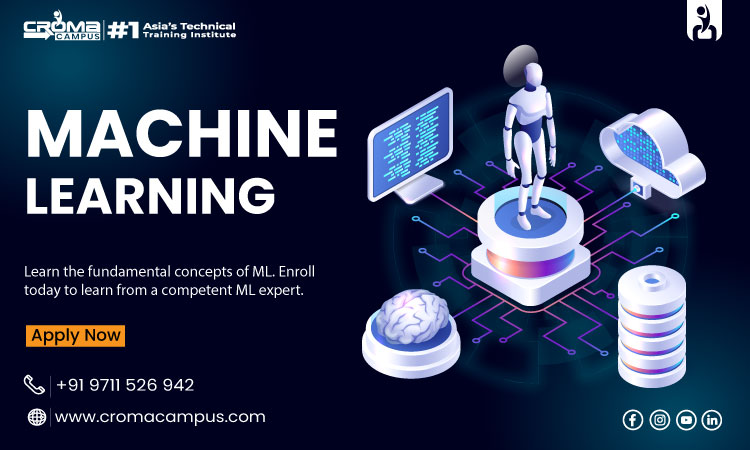Machine learning, in short ML, is a vital sub-field of Artificial Intelligence (AI). This technology can be defined as the capability of modern machines to imitate human behaviour. It learns and improves from data. ML builds methods that leverage data to improve the performance of the models. Thus, the more an ML device receives data, the more it learns to perform certain tasks. An easy example of ML can be Google recommendations or related searches when we search for a topic. Today, Machine Learning is being used in a number of industries like healthcare, medicine, science, hospitality, education, banking, business, etc. One can join the Machine Learning Course to learn various techniques in using ML. Being an in-demand technology, ML training ensures jobs with salary packages from Rs. 3 LPA to Rs. 20 LPA in India.
This article provides insight into the future of Machine Learning and the different career options with ML training. Keep reading for more information.
Machine Learning Future
Machine Learning is constantly evolving. This technology is estimated to evolve further and integrate with newer technologies in the IT world to ensure the best results.
Let us look at the probable future trends in ML.
- Computer Vision
Computer Vision is a popular AI-based technology. In this a computer identifies objects in images and videos. Machine Learning (ML) integrates with Computer Vision to reduce errors. Furthermore, ML in Computer Vision uses methods like the cross-entropy loss to save time to perform certain tasks.
- Focused Personalization
ML is primarily used for personalization. It identifies the preferences of target audiences. Moreover, ML is provides personalized recommendations on various products or services. Accurate personalization in ML enables companies to tailor their products or services for their target customers.
- Improved Internet Search
Machine Learning helps Search Engines optimize their output by analyzing previous data sets. This enhances internet searches and improves the SEO ranking. For example, Google integrates with ML to provide users with more relevant search results based on the enormous number of searches.
- Chatbots
Chatbots are among the latest technological innovations. This technology improves marketing and customer service operations by interacting with the customers. Furthermore, Chatbots interact with the users and prompt the users to ask questions. Such interactions ensure continuous improvement.
- ChatGPT
ChatGPT is a powerful conversational AI model. It comes with a Generative Pre-Trained Transformer (GPT) architecture. ChatGPT uses advanced Deep-Learning techniques to deliver human-like texts based on the input. This software is used to summarise long texts, respond to inquiries, generate coherent answers, etc.
- Transportation Trends
Transportation and aviation companies use ML for more accuracy. The ML models improve transportation safety, efficiency, and the accuracy of Estimated Time Of Arrival (ETA). With such benefits, ML integration in the transport industry is estimated to grow further.
Career Scopes With Machine Learning
ML is being implemented in industries like healthcare, science, hospitality, education, banking, business, transportation, etc.
Let us look at the important job roles with ML training in detail.
- Machine Learning Engineer: They design, build, and deploy various ML models.
- Machine Learning Developer: These professionals build and implement accurate ML models and algorithms into various applications.
- Data Scientist: They collect, analyze, and interpret large amounts of data. These professionals use ML algorithms to find patterns and insights in the data.
- Data Engineer: These professionals are responsible for designing and maintaining the infrastructure and tools.
- NLP Scientist: The NLP Scientists help create a machine that can learn patterns of speech and translate spoken words into other languages.
- Business Intelligence Analyst: They use ML to collect business data and predict future trends to make data-driven decisions.
- Human-Cantered Machine Learning Designer: These professionals develop systems that perform Human-Cantered ML based on information and pattern recognition.
- Research Scientist: They focus on researching and developing new ML algorithms and technologies.
- Artificial Intelligence Engineer: These professionals build and implement AI systems like ML models, NLP systems, Computer Vision Systems, etc.
- Computer Vision Engineer: They work in the field of Computer Vision to enable computers to understand and interpret visual data from their surroundings.
Conclusion
To sum up, Machine Learning is an essential sub-field of Artificial Intelligence (AI). The more an ML-integrated device receives data, the more it learns to perform specific tasks. ML is being implemented in industries like healthcare, science, hospitality, education, banking, business, transportation, etc. The Machine Learning Online Training course prepares aspiring professionals to implement the ML models more effectively. Some common job roles with ML training include Machine Learning Engineers, NLP Scientists, Data Scientists, Machine Learning Developers, etc.



